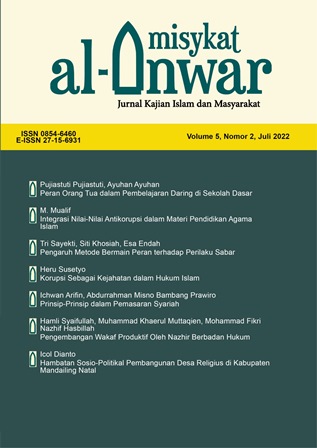Integrasi Nilai-Nilai Antikorupsi dalam Materi Pendidikan Agama Islam
Main Article Content
Abstract
Article Details
All manuscripts published in the Misykat al-Anwar Journal of Islamic Studies and Society are entirely the property of the author, as for the entry and unpublished script of the journal, the copyright is wholly the property of the author.
All manuscripts published in the Misykat al-Anwar Journal of Islamic Studies and Society are open to the public by following the provisions of the CC-BY-NC-SA (Attribution Non Commercial Share Alike) platform where everyone is allowed and permitted to adapt, the results of the study with the provision should provide citation credit to the author (citation) not for commercial purposes, and one must make a similar provision to the results of his research.
---
Semua naskah yang diterbitkan dalam Misykat al-Anwar Jurnal Kajian Islam dan Masyarakat sepenuhnya menjadi hak milik penulis, adapun naskah yang masuk dan belum diterbitkan oleh jurnal, hak cipta sepenuhnya milik penulis.
Semua naskah yang diterbitkan dalam Misykat al-Anwar Jurnal Kajian Islam dan Masyarakat terbuka untuk umum (open access) dengan mengikuti ketentuan platform CC-BY-NC-SA (Attribution Non Commercial Share Alike) semua orang diperbolehkan untuk menyadur, merujuk dan mengadaptasi tulisan/hasil penelitian dengan ketentuan harus memberikan kredit rujukan kepada penulis (citation) bukan untuk kepentingan komersial, dan seseorang harus melakukan ketentuan yang serupa terhadap hasil penelitiannya.
References
Abd. Al Rahman al Nahlawy, (1965). Usȗlu al Tarbiyyah al Islȃmiyyah wa Thuruq Tadrisihȃ (Damaskus: Dar al Nahdhah al Arabiyyah.
Abdullah, M. A. (2017). Islamic studies in higher education in Indonesia: Challenges, impact and prospects for the world community. Al-Jami'ah: Journal of Islamic Studies, 55(2), 391-426.
Atiyah al Abrasyi, (1969). al Tarbiyyah al Islȃmiyyah wa Falsafatuhȃ (Qahiroh: Isa al Babi al Halabi.
Darwis, D., Pratiwi, E. S., & Pasaribu, A. F. O. (2020). Penerapan Algoritma Svm Untuk Analisis Sentimen Pada Data Twitter Komisi Pemberantasan Korupsi Republik Indonesia. Jurnal Ilmiah Edutic: Pendidikan dan Informatika, 7(1), 1-11.Grizzard, M., Matthews, N. L., Francemone, C. J., & Fitzgerald, K. (2021). Do audiences judge the morality of characters relativistically? How interdependence affects perceptions of characters’ temporal moral descent. Human Communication Research, 47(4), 338-363.
Daulay, H. P., & Tobroni, T. (2017). Islamic education in Indonesia: A historical analysis of development and dynamics. British Journal of Education, 5(13), 109-126.
Fauzan, F., & Bahrissalim, B. (2017). Curriculum Analysis teacher professional education program (PPG) of Islamic education in Indonesia. TARBIYA: Journal of Education in Muslim Society, 4(2), 148-161.
Halik, A. (2016). Paradigm of Islamic Education in the Future: The Integration of Islamic Boarding School and Favorite School. Information Management and Business Review, 8(4), 24-32.
Hannam, P., Biesta, G., Whittle, S., & Aldridge, D. (2020). Religious literacy: A way forward for religious education?. Journal of Beliefs & Values, 41(2), 214-226.
Jackson, R., & Everington, J. (2017). Teaching inclusive religious education impartially: An English perspective. British Journal of Religious Education, 39(1), 7-24.
Mas' ud, A., Fuad, A., & Zaini, A. (2019). Evolution and orientation of Islamic education in Indonesia and Malaysia. Journal of Indonesian Islam, 13(1), 21-49.
Munastiwi, E. (2019). Islamic Education in Indonesia and Malaysia: Comparison of Islamic Education Learning Management Implementation. Jurnal Pendidikan Islam, 8(1), 1-26.
Nur Achmad dan Muhammad Ridhwan (aditor), Puasa dan Kejujuran, dari tulisan Sukidi, Ramadhan sebagai Momentum Reformasi, (Jakarta: Penerbit Sindo, 2011).
Panjwani, F., & Revell, L. (2018). Religious education and hermeneutics: the case of teaching about Islam. British Journal of Religious Education, 40(3), 268-276.
Sanseverino, I., Conduto, D., Pozzoli, L., Dobricic, S., & Lettieri, T. (2016). Algal bloom and its economic impact. European Commission, Joint Research Centre Institute for Environment and Sustainability.
